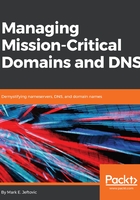
Uniform Domain Name Dispute Resolution Policy (UDRP)
The Uniform Domain Name Dispute Resolution Policy (UDRP) is the primary mechanism by which Intellectual Property (IP) rights are asserted over domain names. If the complainant is successful in bringing a UDRP procedure against an offending domain, it can be canceled or ordered transferred to the complainant. The remedy in successful cases is effectively always a transfer. If the domain is simply canceled, some other Registrant may grab it and you are back to square one
In order to successfully bring a UDRP against a domain name, all three of the following elements must be present:
"(i) your domain name is identical or confusingly similar to a trademark or service mark in which the complainant has rights; and:
- you have no rights or legitimate interests in respect of the domain name; and
- your domain name has been registered and is being used in bad faith."
In a UDRP, the party bringing the action is the Complainant, while the current domain holder defending against the action is the Respondent.
To bring a complaint against a domain, the Complainant selects an authorized Dispute Resolution Provider, such as the National Arbitration Forum (NAF) or the World Intellectual Property Rights Organization (WIPO), files the complaint, and pays the administrative fees.